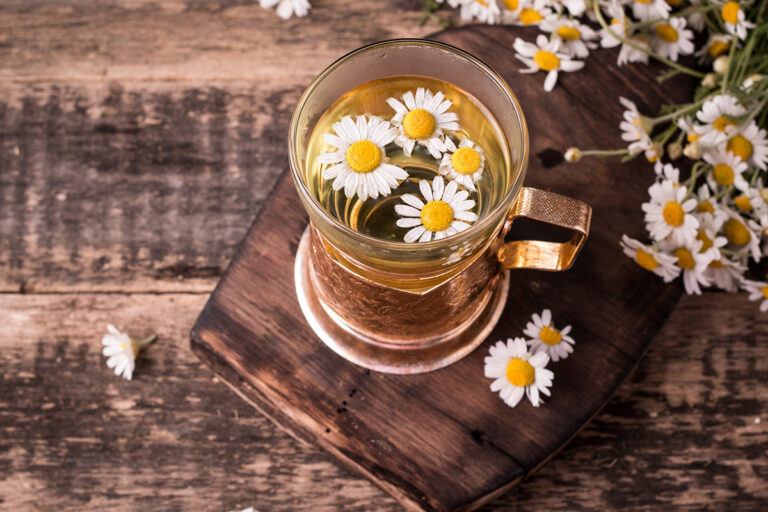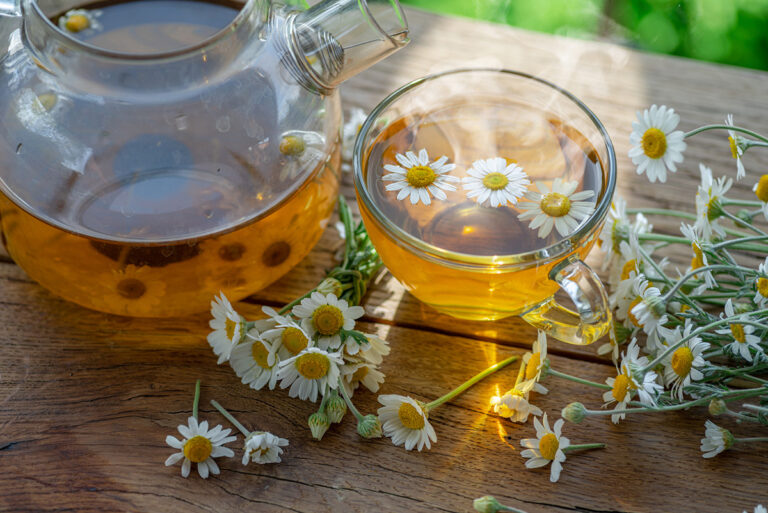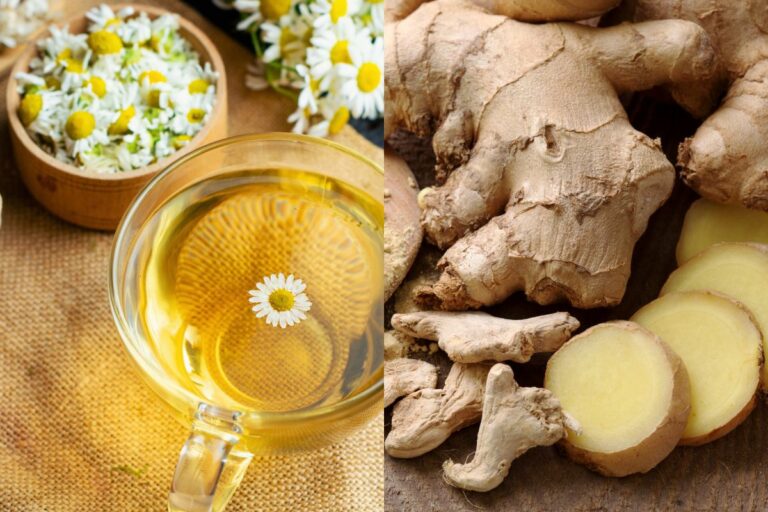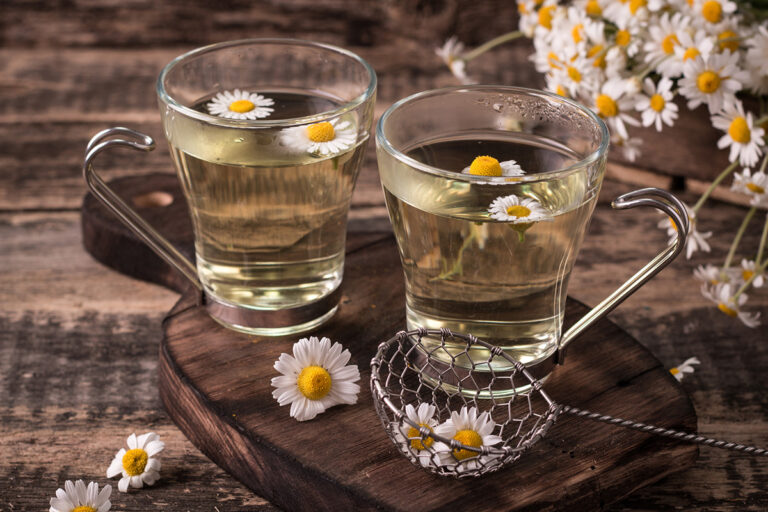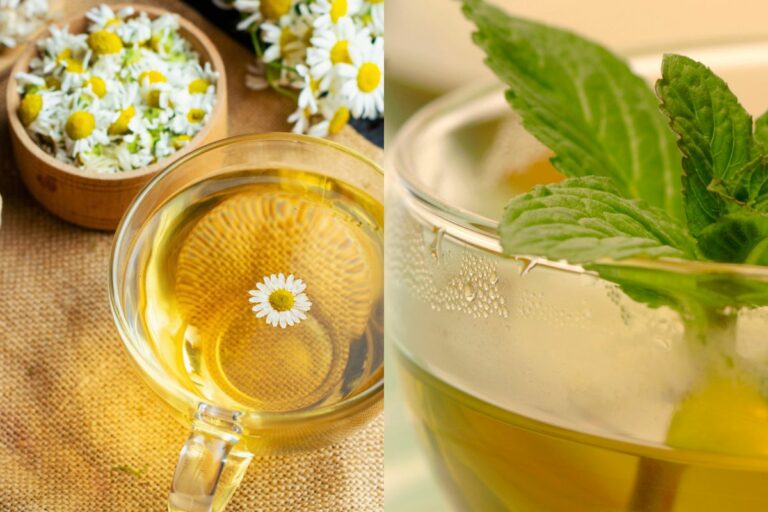8 Chamomile Tea Benefits: Sleep, Digestion, Skin Health, and More
Chamomile tea has been treating insomnia and digestive issues for centuries. But what about this ancient herbal remedy makes it so powerful?
Chamomile’s antioxidants, flavonoids, and oils hold the answer. These compounds are known to have calming effects on the body while providing numerous health benefits.
In this blog post, we will explore the top eight chamomile tea benefits – from helping you get better sleep to improving skin health and digestion.

What Is Chamomile Tea?
Chamomile tea is an herbal tea made from dried chamomile flowers. Chamomile is classified as a flowering plant within the daisy family. The three types of chamomile most frequently used for tea are German, Roman, and Egyptian.
With its lack of caffeine, chamomile tea is often preferred by those seeking a soothing beverage without any stimulating effects.
Chamomile tea boasts a sweet and floral taste; you can drink it either hot or cold. Chamomile tea can be enjoyed independently or blended with herbs like lavender or mint for added flavor. Additionally, it can be added as an ingredient in cocktails or mocktails.
Benefits of Chamomile Tea
Research indicates that chamomile tea is a healthy and scientifically proven dietary addition, offering several benefits.
May Improve Sleep Quality
Chamomile tea may improve sleep quality. According to a study in the Journal of Advanced Nursing, postnatal women with sleep disturbances saw an improvement in sleep quality after drinking chamomile tea before bed (1).
A 28-day study found that consuming 270 mg of chamomile extract twice daily led to one-third fewer nighttime awakenings and quicker sleep onset (2).
These studies suggest that chamomile tea offers a natural and effective solution for enhancing sleep quality.
May Promote Digestive Health
Chamomile tea may provide benefits for digestive health, according to research.
It’s believed to have anti-inflammatory properties that reduce gut inflammation and discomfort (3). Furthermore, a rat study found chamomile beneficial for preventing stomach ulcers by reducing acidity and inhibiting ulcer-causing bacteria (4).
However, further research is necessary to understand these benefits’ extent fully.
May Benefit Blood Sugar Control
Chamomile tea has been suggested to assist in reducing blood sugar levels.
Its anti-inflammatory properties may prevent pancreas cell damage from high blood sugar (5).
The current evidence supporting these benefits should be cautiously approached since it is primarily based on animal studies. Further studies are necessary for a more comprehensive understanding. Nonetheless, the data is promising.
May Improve Heart Health
One advantage of drinking chamomile tea is its rich content of flavones, an antioxidant compound. The potential of these flavones to lower blood pressure and cholesterol levels has been researched, as they are significant indicators of heart disease risk (6). While further investigation is required to establish the extent of chamomile tea’s role in promoting heart health, including it in your diet may be beneficial.
May Sooth Cold Symptoms
Chamomile tea is recognized for its calming effects that may relieve symptoms related to the common cold (5). These include easing congestion, reducing inflammation, and providing a calming effect that may improve sleep quality. However, while helpful, chamomile tea isn’t a cure for cold or flu.
May Reduce the Severity of Anxiety and Depression
Chamomile may potentially reduce the severity of anxiety and depression, as suggested by research (5). However, this evidence is primarily based on using it as aromatherapy or a supplement.
May Improve Skin Health
Anti-inflammatory and antioxidant properties found in chamomile may promote better skin health. These qualities may alleviate redness and irritation, and defend the skin from environmental stressors that could lead to premature aging. Soothing properties in chamomile may offer relief for skin issues like eczema and acne.
However, the benefits of chamomile for the skin are mostly associated with cosmetic products that contain chamomile, like lotions, eye creams, and soaps. It’s unlikely that these benefits apply when consuming chamomile in tea form to the same degree.
May Prevent Bone Loss
There is evidence that chamomile may help prevent bone loss, which can lead to conditions such as osteoporosis (5). While promising, further research is needed to determine if chamomile should be used in clinical applications.
Chamomile Tea Side Effects
Chamomile tea, like all things, may have potential side effects.
Allergic Reactions
Individuals who are allergic to plants in the daisy family may also be allergic to chamomile, as they belong to the same family. Symptoms of an allergic reaction can range from skin rashes, throat swelling, and shortness of breath to severe anaphylaxis in rare cases. If you experience any of these symptoms after consuming chamomile tea, you should seek medical attention immediately.
Drowsiness
Chamomile is widely known for its calming and sleep-inducing properties. As a result, drinking chamomile tea might cause drowsiness. This can be a problem if you need to be alert, such as when driving or operating heavy machinery. It’s recommended to avoid consuming chamomile tea in such situations or before participating in activities requiring full attention.
Blood Thinning
Chamomile contains coumarin, a naturally occurring compound that has blood-thinning properties. This might increase the risk of bleeding, especially in individuals with bleeding disorders or those taking anticoagulant medications, such as warfarin. It’s advisable to talk to a healthcare provider if you fall into these categories and are considering consuming chamomile tea.
Potential Interactions with Other Medications
Chamomile tea may interact with certain medications. For instance, due to its mild sedative effects, it could potentially increase the effects of other sedative medications, leading to increased drowsiness or sleepiness. It may also interact with anticoagulant medications due to its coumarin content, as mentioned earlier. If you’re on any medication, it’s recommended to consult with your healthcare provider before consuming chamomile tea.
Pregnancy and Breastfeeding Concerns
While chamomile tea is often considered safe for general use, its safety during pregnancy and breastfeeding is not fully established. Some research suggests that high doses of chamomile might increase the risk of miscarriage. Also, it’s unknown whether chamomile passes into breast milk. Pregnant or breastfeeding women should, therefore, consult their healthcare provider before consuming chamomile tea.
Who Should Avoid Chamomile Tea?
Most people can safely consume chamomile tea. However, some individuals should avoid drinking it:
- Those with allergies to daisy family plants like ragweed or chrysanthemums should avoid chamomile due to potential allergic reactions.
- Chamomile tea may stimulate the uterus, making it essential for pregnant women to consult with their doctor before drinking it.
- Taking blood thinners or other medications may result in drug interactions with chamomile tea, so consult a healthcare provider before consuming it.
Chamomile Tea Blends and Branded Products
Chamomile tea, renowned for promoting sleep and relaxation, is often enhanced through blends with other calming herbs. One example is a blend of chamomile and lavender.
Takeaway
In summary, chamomile tea is a popular drink with various possible health benefits. Its possible advantages include lowering blood pressure and cholesterol levels, soothing cold symptoms, potentially lessening the severity of anxiety and depression, improving skin health, and preventing bone loss.
Overall, chamomile tea is a worthwhile, caffeine-free drink with potential health benefits.
If you’re looking for high-quality, organic chamomile tea, here are the best chamomile teas we have tried.
FAQ
Does Chamomile Tea Have Caffeine?
Chamomile tea does not have caffeine. Its caffeine-free nature makes it a beloved drink for those seeking a comforting beverage without the energizing impact of caffeine.
What Does Chamomile Tea Taste Like?
Chamomile tea boasts a sweet and floral taste profile with a touch of apple-like notes. Described as having a mellow and soothing taste, it’s a preferred choice for relaxation. Some people also add honey or lemon to their chamomile tea to enhance its taste.
Are Chamomile Tea and Manzanilla Tea the Same?
Manzanilla tea and chamomile tea are essentially the same tea with different names. Manzanilla is simply the Spanish word for chamomile, so when you see tea labeled as manzanilla, it typically refers to chamomile tea. The terms are interchangeable.
How Do You Use Fresh Chamomile?
Chamomile is commonly dried and brewed into tea.
How to Brew Chamomile Tea?
For making chamomile herbal tea, we suggest using approximately one heaped teaspoon of dried tea leaves for every six ounces of water in your pot or cup. Adding more tea is acceptable, as full-flower chamomile teas can be light and fluffy. Boil water thoroughly, then steep the tea for around five minutes. You can relish chamomile tea as it is or mix in some honey for an added touch of sweetness.
You can also consider preparing chamomile tea using fresh flowers.
Is It Safe to Drink Chamomile Tea Every Day?
Drinking chamomile tea daily in moderation is usually considered safe. However, individuals allergic to plants in the daisy family should avoid chamomile. If taking medications or having health issues, consult a healthcare professional before adding chamomile tea to your routine.
Should You Drink Chamomile When You’re Sick?
Drinking chamomile tea may help alleviate some symptoms when you’re sick. Its calming and anti-inflammatory properties have made chamomile a popular remedy for sore throat and relaxation promotion. In addition, drinking chamomile tea can help keep you hydrated while sick.
Although chamomile tea may have benefits, it must always be remembered that consulting with and receiving guidance from a healthcare professional is crucial and cannot be replaced by any home remedy like this one.
Does Chamomile Tea Stain Teeth?
Chamomile tea is not known to stain teeth, unlike other beverages, such as coffee or black tea.
Can I Smoke Chamomile Tea?
While technically possible, smoking chamomile tea is not recommended due to potential health risks associated with inhaling combusted materials, which can harm your lungs and respiratory system.
Is Chamomile Tea Good for Sinus Infection?
Chamomile tea might provide some relief from the symptoms of a sinus infection. It is known for its anti-inflammatory and soothing properties, which could potentially alleviate discomfort and help promote restful sleep.
Is Chamomile Tea Good for Menstrual Cramps?
Chamomile tea is known for its soothing and anti-inflammatory properties, and some women find it helpful for relieving menstrual cramps.
Is Chamomile Tea Good for Headaches?
Chamomile tea is known for its relaxing and anti-inflammatory properties, which could potentially help to ease tension headaches. However, the effect might vary depending on the individual, and it should not replace professional medical advice.
Is Chamomile Tea High in Histamine?
No, chamomile tea is not high in histamine. In fact, it’s often used as a natural antihistamine and anti-inflammatory (7). However, like any food or drink, it can trigger an allergic reaction in some people, which may lead to an increase in histamine levels in their body.
Is Chamomile Tea Good for Singers?
Yes, chamomile tea can be beneficial for singers. It’s known for its soothing and anti-inflammatory properties, which can help relax the vocal cords and alleviate throat discomfort. Additionally, it helps to hydrate the body, which is essential for optimal vocal performance. However, everyone is unique, so it’s best for individuals to see how their own bodies respond to it.
Other teas that are beneficial for singers include ginger, licorice root, peppermint, and lemon with honey.
Is Chamomile Tea Good for Hangover?
Yes, chamomile tea can be beneficial for hangovers. It helps rehydrate the body, soothes the stomach, and improves sleep quality due to its calming effects. It also has anti-inflammatory properties that can alleviate headaches.
Is Chamomile Tea Good for the Liver?
There are no conclusive studies showing that chamomile tea specifically benefits liver health. While chamomile tea has general antioxidant properties, it should not be relied upon as a means to support liver function.
Does Chamomile Tea Detox Your Body?
Chamomile tea is rich in antioxidants and has anti-inflammatory properties, which can support overall health. However, there’s no scientific evidence that it specifically detoxifies the body, and it’s important to remember that your liver and kidneys naturally perform detoxification functions.
Is Chamomile Tea Good for Gout?
Chamomile tea is known for its anti-inflammatory properties, which may help to reduce the inflammation and pain associated with gout. However, it is not a cure for gout and should be used as part of a comprehensive treatment plan under the guidance of a healthcare provider.
Can I Take Magnesium With Chamomile Tea?
Yes, you can take magnesium with chamomile tea. Both are known for their calming effects and can potentially enhance sleep quality when used together.
Does Chamomile Tea Affect Iron Absorption?
While there’s no specific research indicating that chamomile tea affects iron absorption, it’s likely that it doesn’t significantly impact it due to its low tannin levels, which are often responsible for inhibiting iron absorption in other beverages.
Is Chamomile Tea Good For Eczema?
Chamomile may offer some benefits for eczema due to its anti-inflammatory properties, and it’s sometimes used in topical skincare treatments for this condition. However, drinking it may not provide a significant impact, and it’s not a substitute for professional medical advice or treatment.
Does Chamomile Tea Help With Acne?
Topical application of chamomile has been suggested to potentially reduce acne due to its anti-inflammatory properties. However, while chamomile tea is generally good for overall health, there’s no scientific evidence that directly links drinking it to improved acne.
What Color Is Chamomile Tea?
Chamomile tea, when brewed, usually presents a golden yellow color. The exact hue can vary depending on the steeping time and the amount of chamomile used.
Is Chamomile Tea Good For Kidney Stones?
There’s no scientific evidence that chamomile tea can specifically help with kidney stones. However, staying hydrated generally can help prevent kidney stones, and drinking tea contributes to overall hydration.
Is Chamomile Tea Good For Pancreatitis?
The anti-inflammatory properties of chamomile tea may prevent damage to the cells of your pancreas, which occurs when your blood sugar levels are chronically elevated. However, it’s crucial to note that chamomile tea isn’t a recognized treatment for pancreatitis.
Is Chamomile Tea Good For Diverticulitis?
Chamomile tea is often recommended for its soothing properties and anti-inflammatory effects. While it’s not a cure for diverticulitis, drinking chamomile tea may help soothe the digestive system and alleviate some of the symptoms.
Is Chamomile Tea Good For Ulcerative Colitis?
Chamomile tea may have benefits for people with ulcerative colitis due to its anti-inflammatory properties. It might help in reducing inflammation and soothing the digestive tract. However, more scientific research is needed to confirm these effects, and patients should always follow their doctor’s advice and treatment plan.
Is Chamomile Tea Good For IBS?
While chamomile tea may offer some relief for patients with ISB, it may not be suitable for everyone (8). Chamomile tea is high in FODMAPs, specifically polyols, which can trigger symptoms in individuals with IBS.
Is Chamomile Tea Good For Constipation?
Chamomile tea is often used for its soothing and anti-inflammatory properties, which can help to relax the muscles in the intestines and speed up digestion. This could potentially alleviate symptoms of constipation. However, the evidence is anecdotal, and individuals may have different responses.
Other teas may be more beneficial for constipation relief.
Is Chamomile Tea Good For Diarrhea?
Chamomile, traditionally recognized for its calming effect on digestive muscles, can help alleviate symptoms such as indigestion, nausea, motion sickness, and even diarrhea.
A significant research study involving 65 participants indicated that administering 500 mg of chamomile extract twice a day could lower instances of vomiting induced by chemotherapy, relative to a control group (9).
Further evidence from another earlier research conducted on rats demonstrated chamomile extract’s potential in averting diarrhea (3).
It is essential to note that these studies involved high doses of chamomile extract. However, it is plausible that tea brewed from these charming, daisy-like flowers might offer similar relief for various stomach ailments.
Does Chamomile Tea Help With Nausea?
Historically, chamomile has played a significant role in traditional medicine, being utilized to relax the digestive tract and alleviate symptoms such as travel sickness, nausea, flatulence, and indigestion (5).
In an observation spanning four months involving 65 women receiving chemotherapy, it was found that a daily intake of 500 mg of chamomile extract reduced instances of vomiting (9).
Interestingly, another research study involving 105 women revealed that chamomile extract surpassed the effectiveness of ginger in managing nausea and vomiting related to pregnancy (11).
However, it’s crucial for expectant mothers to consult with a healthcare professional before consuming chamomile tea or any other herbal infusions, as they might present potential risks to the pregnancy (12).
Although these studies mainly focused on high-concentration extracts derived from the flower itself, it’s possible that chamomile tea could exhibit comparable effects.
Does Chamomile Tea Help With Fever?
Chamomile tea is not a known cure for fever. However, it can provide some relief due to its hydrating properties and potential to induce sweating, which might help the body cool down.
Is Chamomile Tea Good For Allergies?
While chamomile tea is often touted for its calming and anti-inflammatory properties, there’s no robust scientific evidence to specifically support its effectiveness in treating allergies. Additionally, chamomile can cause allergic reactions in some people, especially those who are sensitive to plants in the daisy family.
Is Chamomile Tea Good For Cough?
Yes, chamomile tea may help soothe a cough and sore throat due to its anti-inflammatory properties. It also promotes hydration and warmth, both beneficial when dealing with a cough. However, it’s not a replacement for medical treatment if the cough persists or is severe.
Is Chamomile Tea Good for Sore Throat?
Chamomile tea is frequently used as a home remedy for sore throats due to its anti-inflammatory properties, which can help soothe throat discomfort. According to the authors of a review article in Molecular Medicine Reports, evidence suggests it may help lubricate your throat, which may be useful in warding off hoarseness and pain (5).
Is Chamomile Tea Addictive?
Chamomile tea is not considered addictive. Its calming effects may make it a preferred drink for relaxation or aiding in sleep, but it does not contain substances known to cause physical dependence or addiction.
Can You Eat Chamomile Tea Leaves?
Yes, chamomile tea leaves are edible and safe to consume. They can be used in a variety of recipes, such as salads or baked goods, for a unique flavor. However, like any plant, they should be properly washed before eating to remove any potential contaminants.
Is Chamomile Tea Good For Weight Loss?
Chamomile tea may contribute to weight loss indirectly as it can aid digestion, reduce stress, and help with sleep, all of which are beneficial for maintaining a healthy weight. However, there’s no direct scientific evidence linking chamomile tea consumption to weight loss.
Is Chamomile Tea Good for Hypothyroidism?
While chamomile tea possesses anti-inflammatory properties, there are no studies available to prove its effectiveness for people with hypothyroidism. However, drinking chamomile tea was linked to a lower risk of developing thyroid cancer in one small Greek study (10).
Does Chamomile Tea Help With Bloating?
Chamomile tea is known for its anti-inflammatory and antispasmodic properties, which can potentially help soothe the stomach and reduce bloating. However, while some research suggests these benefits, it’s important to consult with a healthcare provider for persistent or severe cases of gastritis.
How Much Apigenin in Chamomile Tea?
Dried chamomile flowers contain approximately 3 to 5 mg of apigenin per gram (13). Therefore, the exact amount of apigenin in a cup of chamomile tea will depend on the quantity of dried chamomile used in the brewing process.
Can Pets Drink Chamomile Tea?
Chamomile tea can be given to pets in moderation, but there are some considerations to keep in mind. Dogs, birds, and rabbits can safely consume chamomile tea, but it’s essential to monitor the amount to avoid any adverse effects. While cats can technically drink chamomile tea, it’s not usually recommended due to potential sensitivities.
Always consult a vet before introducing new elements into your pet’s diet.
Does Chamomile Tea Break a Fast?
Generally, unsweetened chamomile tea won’t break a fast because it’s extremely low in calories. However, adding sweeteners or milk can increase the calorie content and potentially disrupt your fast.
Is Chamomile Tea Good for Acid Reflux?
While there’s no concrete scientific proof that chamomile tea directly alleviates acid reflux symptoms, its renowned soothing properties for digestive issues may help indirectly. Given the interconnected nature of human health, its various benefits could contribute to reducing acid reflux symptoms by promoting overall digestive well-being.
How Does Chamomile Tea Differ From Other Teas?
Chamomile tea, a herbal infusion, significantly differs from traditional teas like black, green, and white in terms of flavor, health benefits, and preparation methods. For a detailed comparison, check out our articles on chamomile tea vs. black tea, chamomile tea vs. white tea, and chamomile tea vs. green tea.

